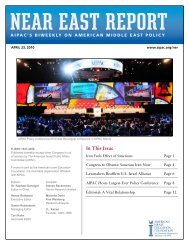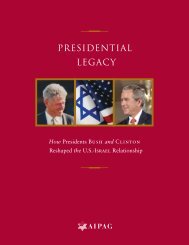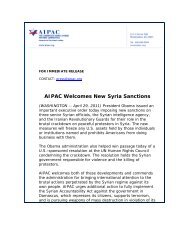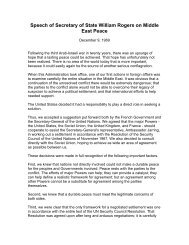2013 Briefing Book - Print Version - Aipac
2013 Briefing Book - Print Version - Aipac
2013 Briefing Book - Print Version - Aipac
You also want an ePaper? Increase the reach of your titles
YUMPU automatically turns print PDFs into web optimized ePapers that Google loves.
ISRAEL AT RISK<br />
2002 alone, Palestinian terrorists murdered more than 300 Israelis and wounded nearly 5,000.<br />
The barrier, most of which runs along Israel’s 1949 armistice line with the Palestinians, has been<br />
remarkably effective in eliminating suicide attacks inside Israel.<br />
Yet in 2004, the International Court of Justice (ICJ) in The Hague voted overwhelmingly to<br />
condemn the barrier, claiming that it would bring undue suffering to Palestinian civilians. The<br />
ICJ blithely dismissed the Jewish state’s argument that the barrier would save Israeli lives. “This<br />
is a dark day for the International Court of Justice and the international legal system,” said Dan<br />
Gillerman, then-Israeli ambassador to the United Nations. “It is shocking and appalling that in<br />
all the 60-plus pages of the opinion, the court failed to address the essence of the problem and<br />
the very reason for building the fence—the indiscriminate and murderous campaign of terror that<br />
Israelis are facing.”<br />
Most Arab States Refuse to Recognize Israel<br />
Today, Israel maintains full diplomatic relations with only 2 of the 22 states that compose the<br />
Arab League: Egypt and Jordan. Many of the 20 remaining Arab states refuse relations with<br />
Israel, refuse to recognize the Jewish state and maintain a persistent propaganda campaign<br />
through their state-sponsored media and educational systems that seek to present Israel as<br />
inherently illegitimate. In addition, the Arab League maintains an official boycott against Israel—a<br />
potent symbol of the Arab world’s refusal to accept the Jewish state in its midst. While multiple<br />
United States presidents, including President Obama, have called on Arab states to undertake<br />
peace gestures, most have yet to do so.<br />
The Boycott, Divestment and Sanctions (BDS) Campaign<br />
In 2005, Palestinian activists, with the support of some 170 Palestinian organizations, launched<br />
a global campaign aimed at persuading countries and organizations of all kinds to boycott,<br />
divest and sanction (BDS) Israel. The BDS campaign, as it came to be known, spread to countries<br />
throughout the world, particularly Europe, and has gained traction on some American campuses.<br />
The campaign has taken various forms: boycotts against Israeli universities, Israeli products,<br />
Israeli sports teams, Israeli cultural events and celebrities traveling to or supporting Israel. The<br />
goal is to treat Israel as a pariah nation.<br />
In Britain, for example, some professors have refused to work with their Israeli counterparts<br />
or to engage in any academic exchange that constitutes a normal part of university life. Ahava,<br />
an Israeli skin care company, closed its store in London in 2011 because of constant protests.<br />
98








